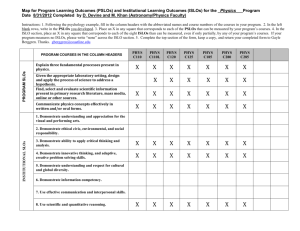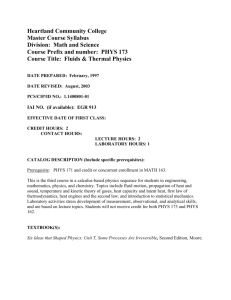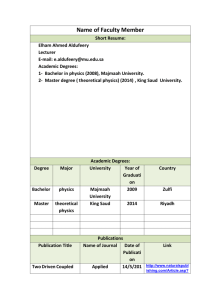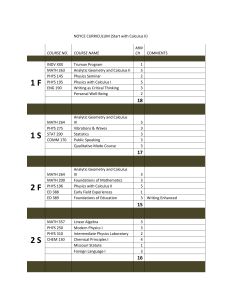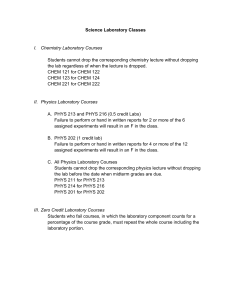PHYS - University of Indianapolis
advertisement
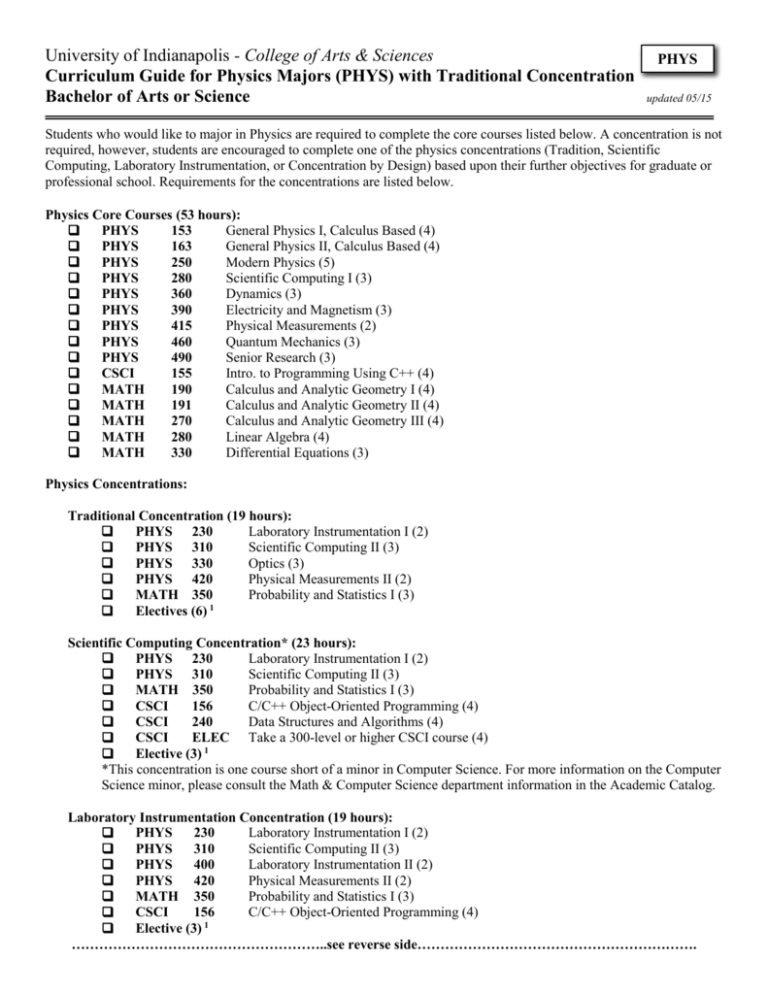
University of Indianapolis - College of Arts & Sciences Curriculum Guide for Physics Majors (PHYS) with Traditional Concentration Bachelor of Arts or Science PHYS updated 05/15 Students who would like to major in Physics are required to complete the core courses listed below. A concentration is not required, however, students are encouraged to complete one of the physics concentrations (Tradition, Scientific Computing, Laboratory Instrumentation, or Concentration by Design) based upon their further objectives for graduate or professional school. Requirements for the concentrations are listed below. Physics Core Courses (53 hours): PHYS 153 General Physics I, Calculus Based (4) PHYS 163 General Physics II, Calculus Based (4) PHYS 250 Modern Physics (5) PHYS 280 Scientific Computing I (3) PHYS 360 Dynamics (3) PHYS 390 Electricity and Magnetism (3) PHYS 415 Physical Measurements (2) PHYS 460 Quantum Mechanics (3) PHYS 490 Senior Research (3) CSCI 155 Intro. to Programming Using C++ (4) MATH 190 Calculus and Analytic Geometry I (4) MATH 191 Calculus and Analytic Geometry II (4) MATH 270 Calculus and Analytic Geometry III (4) MATH 280 Linear Algebra (4) MATH 330 Differential Equations (3) Physics Concentrations: Traditional Concentration (19 hours): PHYS 230 Laboratory Instrumentation I (2) PHYS 310 Scientific Computing II (3) PHYS 330 Optics (3) PHYS 420 Physical Measurements II (2) MATH 350 Probability and Statistics I (3) Electives (6) 1 Scientific Computing Concentration* (23 hours): PHYS 230 Laboratory Instrumentation I (2) PHYS 310 Scientific Computing II (3) MATH 350 Probability and Statistics I (3) CSCI 156 C/C++ Object-Oriented Programming (4) CSCI 240 Data Structures and Algorithms (4) CSCI ELEC Take a 300-level or higher CSCI course (4) Elective (3) 1 *This concentration is one course short of a minor in Computer Science. For more information on the Computer Science minor, please consult the Math & Computer Science department information in the Academic Catalog. Laboratory Instrumentation Concentration (19 hours): PHYS 230 Laboratory Instrumentation I (2) PHYS 310 Scientific Computing II (3) PHYS 400 Laboratory Instrumentation II (2) PHYS 420 Physical Measurements II (2) MATH 350 Probability and Statistics I (3) CSCI 156 C/C++ Object-Oriented Programming (4) Elective (3) 1 ………………………………………………..see reverse side……………………………………………………. Concentration by Design Students may also take advantage of the concentration by design option. Students should consult with the department before developing a proposal for the concentration by design to be certain that it has a reasonable chance of being approved by the faculty. The basic requirements are: Electives (15) Take a minimum of 15 hours of approved technical electives at the 200-level or higher. Minimum of one PHYS course, 300-level or higher. One elective must be 300-level or higher. 1: Electives: 300-level or higher Physics, Chemistry, Biology, Computer Science or Math courses. Note: Be aware of prerequisites. A 300 or 400-level course might require the completion of an introductory sequence in that subject. NOTE: This degree includes a Math Minor. NOTE: It is recommended that students take one year of general chemistry (CHEM 150 and 160). NOTE: The Physics major requires a total of 53 credit hours (30 credits in physics, 19 credits in math and 4 credits in computer programming.) NOTE: A grade of C- (1.7 on a 4.0 scale) or higher is required in all courses applying toward the Physics major. The Bachelor of Science Degree requires a minimum of 120 hours. This program may require attendance in both day and extended programs classes. See the General Education Core Guide for additional course requirements. REMEMBER: If you have any questions about the Physics Major requirements, contact a faculty advisor from the Physics & Earth Space Sciences Department (Steve Spicklemire, 788-3313; Lilly Science Hall, Room 232B) or the Center for Advising & Student Achievement (788-2057, Schwitzer Student Center, Room 206). Courses and requirements sometimes change so keep in contact with your advisor.
